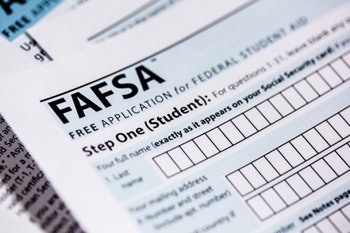Here’s a hypothetical scenario: A low-income student qualifies for the Pell Grant but for not the maximum amount. Her parents contribute some money toward her tuition, recorded as Estimated Family Contribution on the student’s federal financial aid application form.
Then COVID-19 hits. Both parents lose their jobs. But the student’s financial aid package remains the same, despite the drastic change in her family’s finances, a result of the “prior prior year” policy, designed to make the FAFSA simpler by using earlier information provided by the student.
There’s a mechanism to work around this problem called professional judgement. A brief released on Thursday by The Education Trust, a nonprofit focused on education opportunity gaps, highlights its power – and current limits – as a tool for racial equity.
Professional judgement allows a financial aid officer to review a new situation – like a student’s loss of income or an unexpected medical expense – and accordingly adjust the data used to calculate Expected Family Contribution or the elements that add up to cost of attendance for an updated financial aid package. As a result, students can receive financial aid that better reflects their real-time needs.
“This is a moment where financial resources are more important than ever as so many students and families are struggling as a result of the economic crisis caused by COVID-19,” said Dr. Tiffany Jones, senior director of higher education policy at The Education Trust. “Obviously, students from low-income families, Black and Brown students, struggled to afford college prior to the crisis but even more so now that we’re in the throws of it. And what it also means is a lot of sudden changes in their financial situation and standing.”
Previously, financial aid offices have been reticent to use professional judgement because the U.S. Department of Education flags it as a reason for audits. But this summer, the department issued new guidance assuring colleges that they wouldn’t be audited for the practice this academic year.
There’s now been a marked increase in professional judgement requests, according to a September 2020 survey by the National Association of Student Financial Aid Administrators (NASFAA). And those are only the students who even know this is a path available to them, pointed out Jaime Ramirez-Mendoza, a higher education policy analyst at The Education Trust.














